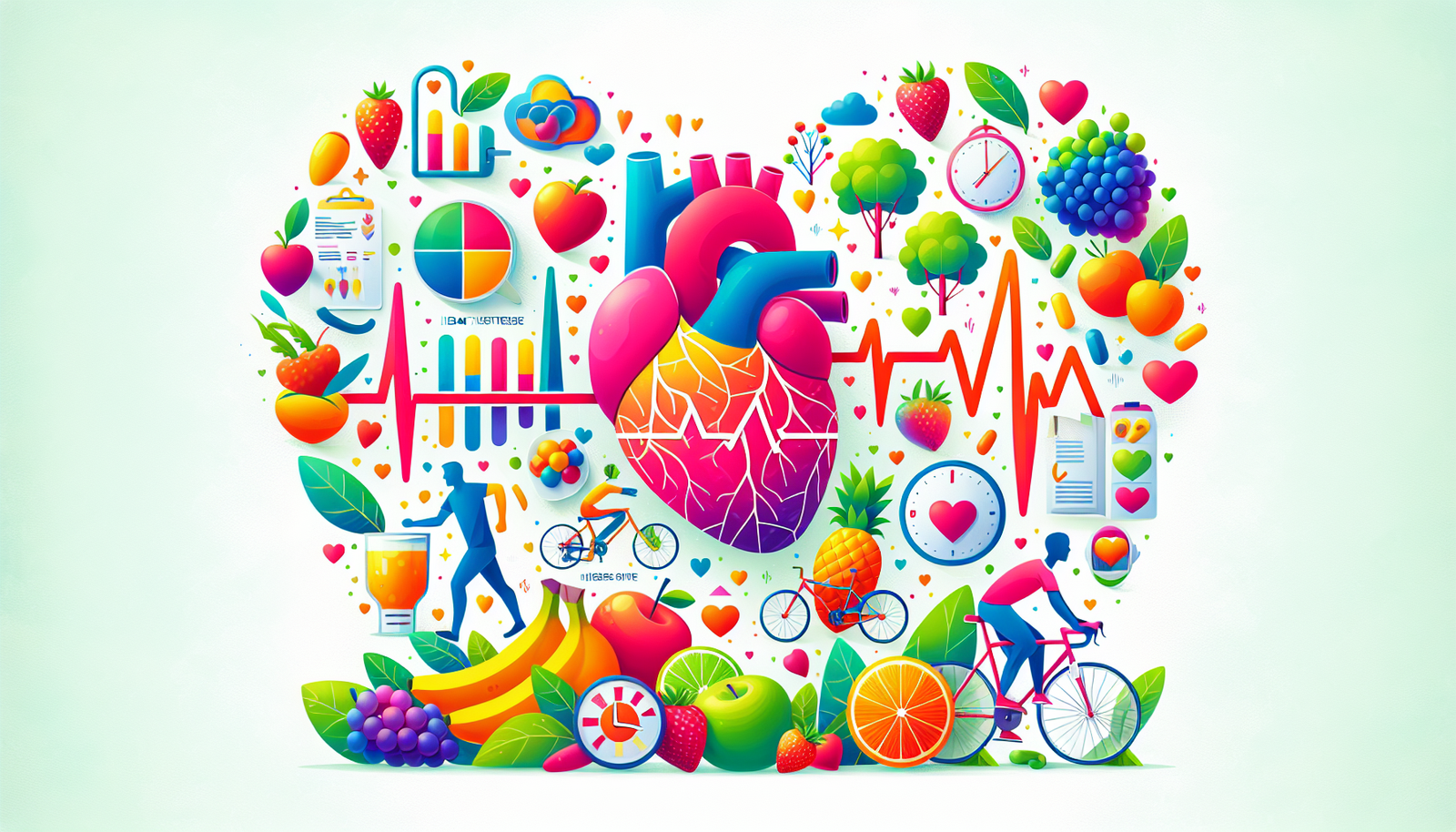The Role of Exercise in Cardiovascular Support
Understanding Cardiovascular Health
Cardiovascular health is crucial for overall well-being, impacting everything from physical performance to longevity. The heart and blood vessels work together to deliver oxygen and nutrients to tissues, and any dysfunction in this system can lead to serious health issues such as hypertension, heart attacks, and strokes. Therefore, understanding and supporting the cardiovascular system is essential.
The Connection Between Exercise and Heart Health
Regular physical activity has been shown to significantly improve cardiovascular health. Exercise influences various physiological functions, including blood flow, heart rate, and blood pressure. It also promotes the healthy functioning of the heart and blood vessels, reducing the risk of cardiovascular diseases.
Types of Exercise Beneficial for Cardiovascular Support
-
Aerobic Exercise:
- Definition: Activities that rely on aerobic energy systems, primarily involving extended periods of moderate to high-intensity exercise.
- Examples: Walking, running, cycling, swimming, and dancing.
- Impact: Aerobic workouts improve the efficiency of the cardiovascular system by enhancing heart rate and increasing lung capacity. They also promote vascular health by improving circulation.
-
Resistance Training:
- Definition: Exercises designed to improve strength and endurance by working against a force.
- Examples: Weight lifting, bodyweight exercises (e.g., push-ups), and resistance band exercises.
- Impact: Resistance training can help lower blood pressure and improve cholesterol levels, enhancing metabolic health and complementing aerobic exercises for optimal heart strength.
- Flexibility and Stretching:
- Definition: Activities aimed at improving the range of motion of the muscles and joints.
- Examples: Yoga, Pilates, and static stretching.
- Impact: Improved flexibility can enhance physical performance, reduce injury risk, and support overall cardiovascular function by improving blood flow to tissues.
Physiological Benefits of Exercise on the Heart
Improved Heart Function
Regular exercise leads to a stronger heart muscle, allowing it to pump blood more efficiently throughout the body. This enhanced cardiac output means that the heart doesn’t need to work as hard at rest, resulting in a lower resting heart rate.
Reduced Blood Pressure
Engaging in moderate to vigorous physical activity can help lower blood pressure by enhancing the elasticity of blood vessels, thereby improving blood flow. A consistent exercise regimen can lead to significant reductions in both systolic and diastolic blood pressure.
Enhanced Lipid Profile
Exercise plays a vital role in managing cholesterol levels. It can increase high-density lipoprotein (HDL) cholesterol (the "good" cholesterol) and decrease levels of low-density lipoprotein (LDL) cholesterol (the "bad" cholesterol). This balance helps prevent plaque buildup in arteries, reducing the risk of atherosclerosis.
The Role of Exercise in Weight Management
Maintaining a healthy weight is crucial for cardiovascular health, and exercise is a key component of any weight management strategy. Physical activity burns calories, which can help prevent overweight and obesity, conditions that significantly increase the risk of cardiovascular diseases.
Metabolism Boost
Regular exercise enhances metabolic rate, allowing individuals to burn more calories even at rest. Engaging in both aerobic and resistance training can stimulate metabolism, making it easier to achieve and maintain healthy body weight over time.
Psychological Benefits of Exercise
Mental health and cardiovascular health are interconnected, and exercise is a powerful tool for promoting psychological well-being. Regular physical activity can reduce feelings of depression and anxiety, which are known to contribute to various physiological stressors that can negatively affect heart health.
Stress Reduction
Exercise serves as an effective stress management tool, as it promotes the release of endorphins, chemicals in the brain that function as natural painkillers and mood elevators. Lower levels of stress translate into lower heart rates and blood pressure, which benefits cardiovascular function.
Recommendations for Exercise
Frequency and Intensity
The American Heart Association recommends at least 150 minutes of moderate-intensity aerobic exercise per week or 75 minutes of vigorous-intensity exercise. This can be broken down into manageable sessions, such as 30 minutes a day, five days a week.
Incorporating Resistance Training
In addition to aerobic exercise, incorporating strength training exercises at least two days a week can optimally support heart health. This combination of aerobic and resistance training can be tailored to individual fitness levels and preferences.
Staying Active Throughout the Day
Incorporating physical activity into daily life can bolster health without requiring significant time commitments. Simple actions like taking the stairs instead of the elevator, walking during break times, and engaging in household chores can accumulate beneficial exercise.
Challenges to Sustaining an Exercise Regimen
While the benefits of regular exercise for cardiovascular health are clear, there are challenges that many individuals face when trying to maintain a consistent activity routine. Understanding and addressing these challenges can foster a more sustainable approach to fitness.
Time Constraints
Many people cite time as a significant barrier to regular exercise. Planning and prioritizing physical activity can help overcome this hurdle. Utilizing short workout sessions, such as high-intensity interval training (HIIT), allows individuals to gain maximum benefits in minimal time.
Motivation and Enjoyment
Finding enjoyable activities is crucial for sustaining a long-term exercise regimen. Individuals should explore various types of workouts to discover what they love, whether it’s group fitness classes, outdoor activities, or solo workouts.
Injury and Recovery
Injuries can derail an exercise routine, deter individuals from engaging in physical activity, or cause long-term health challenges. Following proper exercise techniques and ensuring adequate recovery during and after workouts is vital for minimizing injury risk.
Nutrition’s Role in Cardiac Health
While exercise plays a vital role in cardiovascular support, nutrition is equally important. A well-balanced diet can complement an active lifestyle, further promoting heart health.
Heart-Healthy Foods
- Fruits and Vegetables: Rich in vitamins, minerals, and antioxidants, these foods contribute to overall heart health and combat oxidative stress.
- Whole Grains: Foods like brown rice, oatmeal, and whole-wheat bread provide fiber that helps lower cholesterol levels and stabilize blood sugar.
- Lean Proteins: Fish, poultry, beans, and legumes provide necessary nutrients while keeping saturated fat intake lower.
- Healthy Fats: Incorporating sources of healthy fats, such as avocados, nuts, and olive oil, promotes a favorable lipid profile and reduces inflammation.
Integrating Fitness into Daily Routine
Creating a Personal Exercise Plan
Establishing a personalized exercise plan can help clarify goals and promote consistency. This plan should factor in lifestyle, fitness level, and individual preferences while ensuring a balanced approach that includes aerobic, resistance, and flexibility training.
Accountability and Support
Joining exercise groups, hiring a personal trainer, or enlisting friends and family members for workouts can enhance motivation and accountability. Sharing fitness goals and celebrating achievements fosters a supportive community that encourages sustained participation.
Technology and Exercise
Incorporating technology can enhance the fitness experience—fitness apps, wearable devices, and online workout platforms can help monitor progress, set reminders, and connect with others for shared exercises.
Conclusion
Supporting cardiovascular health through exercise is not simply about reducing risks; it embodies a holistic approach to wellness. Through awareness of the benefits, challenges, and strategies for successful exercise habits, individuals can empower themselves to foster a heart-healthy lifestyle conducive to overall health and longevity.








